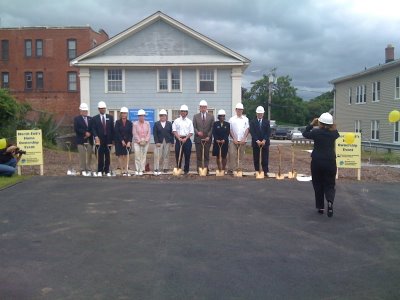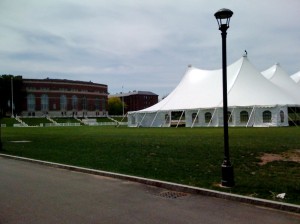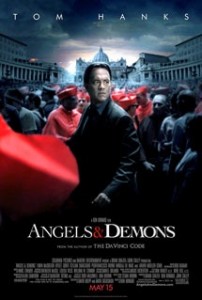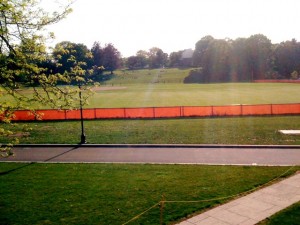July 4th weekend in Middletown has been a wonderful time to show off our town and campus to some relatives visiting from Norway. It’s always interesting to see where one lives through the eyes of visitors. We grow accustomed to the beauty of the campus, with its impressive array of facilities — from the Freeman Athletic Center to the Center for the Arts. Kari’s cousins’ reactions to seeing Wesleyan for the first time was a reminder of how special university environments are. As the gloomy weather lifted, Middletowners came out in force to enjoy a perfect 4th. Check out recent posts by biology professor Steve Devoto and by alumna Jennifer Alexander ’88 on the Middletown Eye. http://middletowneyenews.blogspot.com
I had the curious task of leading my weekly Torah study group on the 4th of July, pinch-hitting for our vacationing rabbi. This week’s texts included the famously paradoxical purification ritual of the “red heifer.” I didn’t attempt to solve the enigma that is said to have stumped even Solomon but instead used the coincidence with the American holiday to talk about how a people achieves “independence.” In the case of the Jews wandering in the desert, this has to do with independence from the experience of slavery (without forgetting that experience). In the case of America, one might say that we are still working out what independence means in a dynamic, multi-polar world.
American Studies has been at the forefront of interdisciplinary academic work at Wesleyan, for years inspired by the popular culture analysis of Richard Slotkin. His work in film studies along with Jeanine Basinger’s has been fundamental to establishing film studies here. Recently, American Studies at Wes has been in a “post-national” key, exploring social and cultural formations that go beyond national borders. I’ve learned about that trend from Professor Claire Potter, who recently stepped down as Chair of the program. Claire writes about pornography, the FBI and has a very active blog: http://tenured-radical.blogspot.com . Wesleyan’s government department is home to prolific and influential scholars of American law and politics who are also great teachers. Here are just two examples: John Finn, an expert on law, civil liberties and political violence who has just published a new edition of his co-authored American Constitutional Law; and Elvin Lim, whose incisive work on the American presidency and politics has been getting enormous attention (check out his blog: http://www.elvinlim.com ).
Although I am a European historian, I’ve often written on American topics, especially in the press. In some of my classes we read Emerson’s take on self-reliance, or Stanley Cavell’s essays on the “unfinished project” of freedom for Americans. A few years ago I was asked to review a French philosopher’s take on the USA in American Vertigo, by Bernard-Henri Levy. Like many other reviewers, I thought the book shallow and self-serving. Today the San Francisco Chronicle published my view of Simon Schama’s new book, The American Future: A History. Although the book has its faults, I thought this British historian (now a long-term US resident) provided an interesting perspective on recent American politics in relation to some long term historical themes: http://www.sfgate.com/cgi-bin/article.cgi?f=/c/a/2009/07/03/RVMH17MMII.DTL&type=books
Well, my Norwegian guests are ready for the next round of activities. I wonder what else I’ll learn about Middletown from them!
[tags]July 4, Steve Devoto, Jennifer Alexander, Middletown Eye, Torah study, independence, Richard Slotkin, Claire Potter, John Finn, Elvin Lim, The American Future: A History, Simon Schama[/tags]



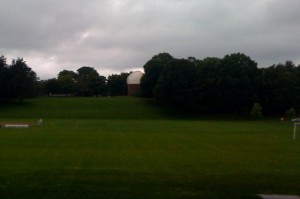 As is often the case, as we think about new programs we are also reminded of our past. In the final days of the fiscal year Wesleyan was the beneficiary of a significant bequest. John Pallein graduated with an English major in 1950, and spent the next two years in the US Army, serving in Japan and Korea. He began working as a technical writer, first for Pratt and Whitney and later for Beckman Instruments. I met John in California just before I moved back to Middletown, and it was clear that he felt a strong loyalty to alma mater. We talked about his work in the President’s House for Victor Butterfield’s family, and his enthusiasm about recent Wes students he had met. A gentle and amiable person, we spoke about the difficulties of leaving the West Coast after so many years. John had settled in one of the most beautiful spots I’d ever seen, Dana Point, but it was clear that Middletown was a locus of cherished memories for him. John’s bequest of more than $3 million will endow financial aid packages for Pallein Scholars in perpetuity, so that deserving students can also have access to the kinds of transformative educational experiences that served him so well.
As is often the case, as we think about new programs we are also reminded of our past. In the final days of the fiscal year Wesleyan was the beneficiary of a significant bequest. John Pallein graduated with an English major in 1950, and spent the next two years in the US Army, serving in Japan and Korea. He began working as a technical writer, first for Pratt and Whitney and later for Beckman Instruments. I met John in California just before I moved back to Middletown, and it was clear that he felt a strong loyalty to alma mater. We talked about his work in the President’s House for Victor Butterfield’s family, and his enthusiasm about recent Wes students he had met. A gentle and amiable person, we spoke about the difficulties of leaving the West Coast after so many years. John had settled in one of the most beautiful spots I’d ever seen, Dana Point, but it was clear that Middletown was a locus of cherished memories for him. John’s bequest of more than $3 million will endow financial aid packages for Pallein Scholars in perpetuity, so that deserving students can also have access to the kinds of transformative educational experiences that served him so well.